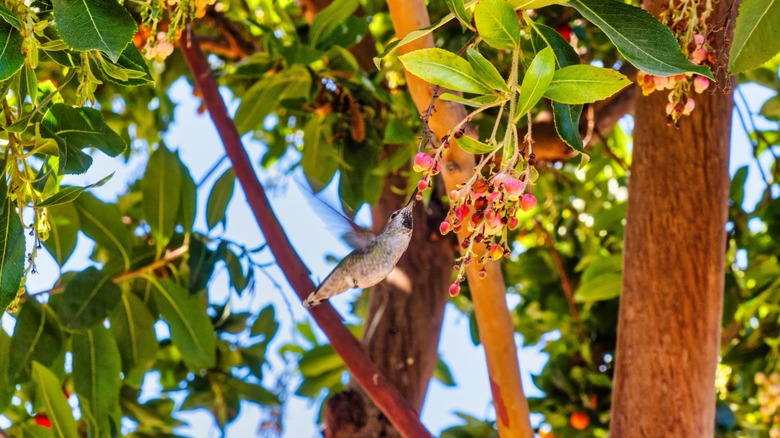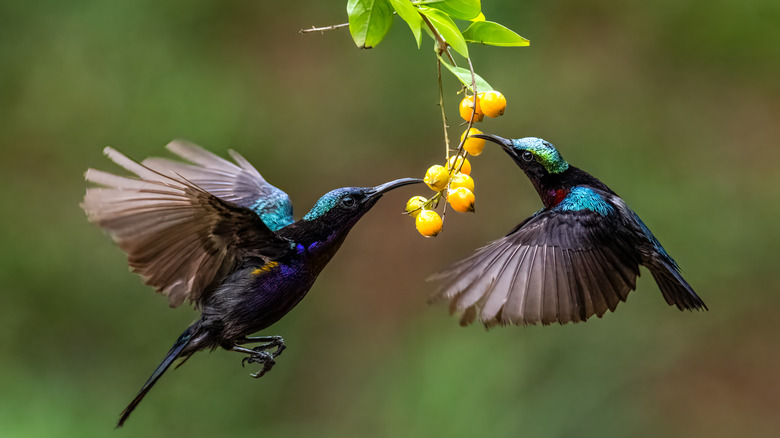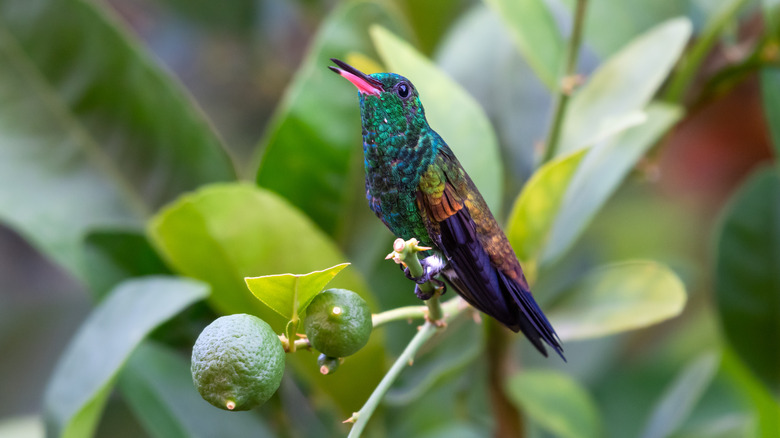Grow These Popular Fruit Plants To Attract Hummingbirds To Your Yard
If you want to encourage more hummingbirds to come to your yard, then growing fruit plants can be a great option. Hummingbirds love nectar, but they are also known to occasionally indulge in fruit juices, especially when nectar sources are limited. While fruit isn't their primary food source, planting fruit-bearing plants can complement the nectar-rich flowers they enjoy, entice hummingbirds to your garden, and encourage them to stick around. Some popular fruit plants to attract hummingbirds are those that are visually appealing, since they are naturally drawn to bright colors. Much like the vibrant flowers they're accustomed to, high-sugar fruit plants that are red, orange, or yellow tend to catch their eye. These can include fruit plants like berries, citrus trees, figs, permissions, or prickly pears!
Hummingbirds can't pierce the skin of fruits on their own, but if the fruit is overripe, damaged, or already pecked by other birds, it becomes an easy snack for them. Even more likely is that hummingbirds may be attracted to fruit plants indirectly. Many fruiting plants produce big flowers and attract insects, another important food source for hummingbirds. The tiny birds need protein to stay strong and active, and insects like fruit flies and gnats that gather around fruit provide an excellent source of nourishment. Of course, you may enjoy feasting on the fresh fruits from your garden too.
Berry plants: A hummingbird favorite
Berries are one of the best fruit options to plant if you're aiming to attract more hummingbirds to your garden. Even though the birds won't feast on the whole berries themselves, the juice from crushed or overly ripe berries can provide them with a refreshing drink. One excellent choice is elderberries. Elderberry bushes produce clusters of small, dark berries that can attract not only hummingbirds but also other wildlife like butterflies and bees. The flowers that bloom before the berries are a bonus too, as they can produce nectar that will draw hummingbirds in before the fruit appears.
Raspberries and blackberries are other great options. Both berries are extra juicy, and hummingbirds will often take advantage of that, especially in late summer when the nectar from flowers that hummingbirds love has mostly dried up. These bramble plants are also known to attract a lot of insects, providing an additional food source for the hummingbirds. Plus, they are relatively easy to grow in a variety of climates. Blueberries can also make your garden more inviting to hummingbirds, especially for their flower nectar. These small berries are also full of sweet juice and can sometimes catch a hummingbird's interest, especially when they're in the soft, ripe stage.
Fruit trees that help attract hummingbirds
Besides berry bushes, there are also certain fruit trees can be an excellent addition to your hummingbird-friendly garden. These fruits might seem too big for hummingbirds, but as the fruit ripens and sometimes splits, it can release juices that hummingbirds might sip on if their usual nectar sources are limited. One potential option is the fig tree, which attracts a variety of small insects that hummingbirds are known to catch and eat. They have also been seen feeding on the sweet tree sap or juices of ripened split figs themselves. If you live in a warmer climate, a fig tree can be a perfect addition to your yard, benefiting hummingbirds and also providing you with delicious fruits!
Citrus trees, such as oranges, can also attract hummingbirds. The sweet scent of their blossoms is often a powerful attractant for these nectar-loving birds, and the fruit itself may provide an occasional treat. Additionally, hummingbirds may nest or perch on your citrus trees. Tropical fruits like papaya, banana, and mango can also be great because their flesh is soft and easily overripens. Those in slightly cooler climates might consider planting apple or pear trees. If any apples or pears become overripe and break open, hummingbirds might take a few sips of the juice, especially during hotter months when water and nectar are harder to come by. While hummingbirds won't always eat the fruits themselves, these fruit trees can also attract plenty of insects, which provide a valuable protein source for the birds.


